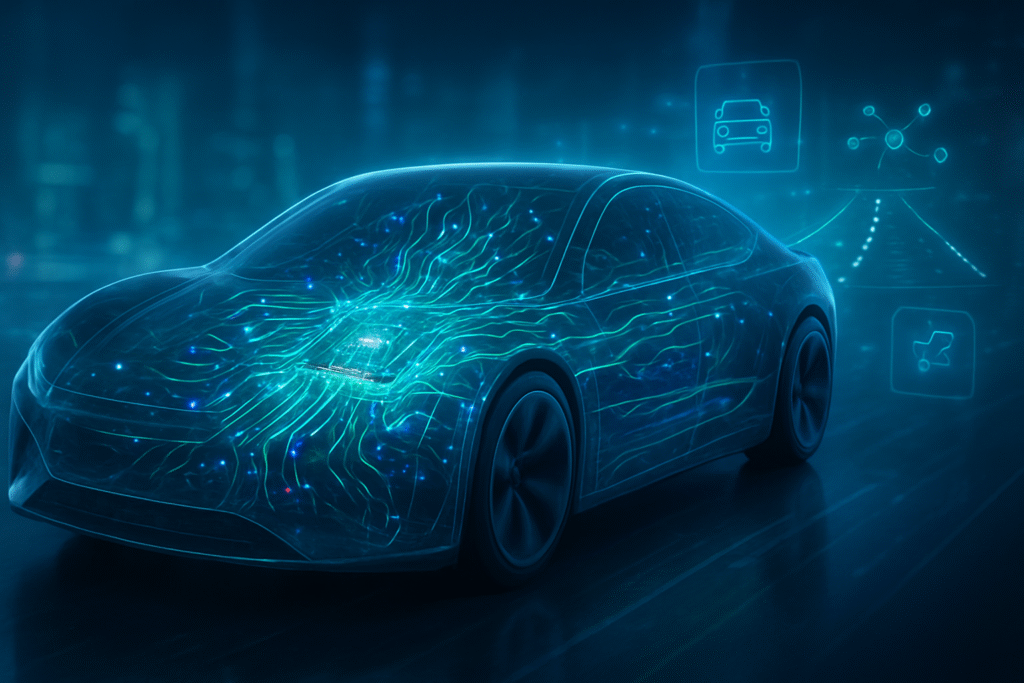Financial News
The Silicon Brain: How Specialized Chipsets Are Driving Automotive’s Intelligent Revolution

The automotive industry is undergoing a profound transformation, rapidly evolving from a mechanical domain into a sophisticated, software-defined ecosystem where vehicles function as "computers on wheels." At the heart of this revolution lies the escalating integration of specialized chipsets. These advanced semiconductors are no longer mere components but the central nervous system of modern automobiles, enabling a vast array of innovations in safety, performance, connectivity, and user experience. The immediate significance of this trend is its critical role in facilitating next-generation automotive technologies, from extending the range and safety of electric vehicles to making autonomous driving a reality and delivering immersive in-car digital experiences. The increasing demand for these highly reliable and robust semiconductor components highlights their pivotal role in defining the future landscape of mobility, with the global automotive chip market projected for substantial growth in the coming years.
The Micro-Engineers Behind Automotive Innovation
The push for smarter, safer, and more connected vehicles has necessitated a departure from general-purpose computing in favor of highly specialized silicon. These purpose-built chipsets are designed to manage the immense data flows and complex algorithms required for cutting-edge automotive functions.
In Battery Management Systems (BMS) for electric vehicles (EVs), specialized chipsets are indispensable for safe, efficient, and optimized operation. Acting as a "battery nanny," BMS chips meticulously monitor and control rechargeable batteries, performing crucial functions such as precise voltage and current monitoring, temperature sensing, and estimation of the battery's state of charge (SOC) and state of health (SOH). They also manage cell balancing, vital for extending battery life and overall pack performance. These chips enable critical safety features by detecting faults and protecting against overcharge, over-discharge, and thermal runaway. Companies like NXP Semiconductors (NASDAQ: NXPI) and Infineon (XTRA: IFX) are developing advanced BMS chipsets that integrate monitoring, balancing, and protection functionalities, supporting high-voltage applications and meeting stringent safety standards up to ASIL-D.
Autonomous driving (AD) technology is fundamentally powered by highly specialized AI chips, which serve as the "brain" orchestrating complex real-time operations. These processors handle the massive amounts of data generated by various sensors—cameras, LiDAR, radar, and ultrasound—enabling vehicles to perceive their environment accurately. Specialized AI chips are crucial for processing these inputs, performing sensor fusion, and executing complex AI algorithms for object detection, path planning, and real-time decision-making. For higher levels of autonomy (Level 3 to Level 5), the demand for processing power intensifies, necessitating advanced System-on-Chip (SoC) architectures that integrate AI accelerators, GPUs, and CPUs. Key players include NVIDIA (NASDAQ: NVDA) with its Thor and Orin platforms, Mobileye (NASDAQ: MBLY) with its EyeQ Ultra, Qualcomm (NASDAQ: QCOM) with Snapdragon Ride, and even automakers like Tesla (NASDAQ: TSLA), which designs its custom FSD hardware.
For in-car entertainment (ICE) and infotainment systems, specialized chipsets play a pivotal role in creating a personalized and connected driving experience. Automotive infotainment SoCs are specifically engineered for managing display audio, navigation, and various in-cabin applications. These chipsets facilitate features such as enhanced connectivity, in-vehicle GPS with real-time mapping, multimedia playback, and intuitive user interfaces. They enable seamless smartphone integration, voice command recognition, and access to digital services. The demand for fast boot times and immediate wake-up from sleep mode is a crucial consideration, ensuring a responsive and user-friendly experience. Manufacturers like STMicroelectronics (NYSE: STM) and MediaTek (TPE: 2454) provide cutting-edge chipsets that power these advanced entertainment and connectivity features.
Corporate Chessboard: Beneficiaries and Disruptors
The increasing importance of specialized automotive chipsets is profoundly reshaping the landscape for AI companies, tech giants, and startups, driving innovation, fierce competition, and significant strategic shifts across the industry.
AI chip startups are at the forefront of designing purpose-built hardware for AI workloads. Companies like Groq, Cerebras Systems, Blaize, and Hailo are developing specialized processors optimized for speed, efficiency, and specific AI models, including transformers essential for large language models (LLMs). These innovations are enabling generative AI capabilities to run directly on edge devices like automotive infotainment systems. Simultaneously, tech giants are leveraging their resources to develop custom silicon and secure supply chains. NVIDIA (NASDAQ: NVDA) remains a leader in AI computing, expanding its influence in automotive AI. AMD (NASDAQ: AMD), with its acquisition of Xilinx, offers FPGA solutions and CPU processors for edge computing. Intel (NASDAQ: INTC), through its Intel Foundry services, is poised to benefit from increased chip demand. Hyperscale cloud providers like Google (NASDAQ: GOOGL), Microsoft (NASDAQ: MSFT), and Amazon (NASDAQ: AMZN) are also developing custom ASICs (e.g., Google's TPUs) to optimize their cloud AI workloads, reduce operational costs, and offer differentiated AI services. Samsung (KRX: 005930) benefits from its foundry business, exemplified by its deal to produce Tesla's next-generation AI6 automotive chips.
Automotive OEMs are embracing vertical integration or collaboration. Tesla (NASDAQ: TSLA) designs its own chips and controls its hardware and software stack, offering streamlined development and better performance. European OEMs like Stellantis (NYSE: STLA), Mercedes-Benz (ETR: MBG), and Volkswagen (OTC: VWAGY) are adopting collaborative, platform-centric approaches to accelerate the development of software-defined vehicles (SDVs). Traditional automotive suppliers like NXP Semiconductors (NASDAQ: NXPI) and Bosch are also actively developing AI-driven solutions for automated driving and electrification. Crucially, TSMC (NYSE: TSM), as the world's largest outsourced semiconductor foundry, is a primary beneficiary, manufacturing high-end AI chipsets for major tech companies.
This intense competition is driving a "AI chip arms race," leading to diversification of hardware supply chains, where major AI labs seek to reduce reliance on single-source suppliers. Tech giants are pursuing strategic independence through custom silicon, disrupting traditional cloud AI services. Chipmakers are evolving from mere hardware suppliers to comprehensive solution providers, expanding their software capabilities. The rise of specialized chipsets is also disrupting the traditional automotive business model, shifting towards revenue generation from software upgrades and services delivered via over-the-air (OTA) updates. This redefines power dynamics, potentially elevating tech giants while challenging traditional car manufacturers to adapt or risk being relegated to hardware suppliers.
Beyond the Dashboard: Wider Significance and Concerns
The integration of specialized automotive chipsets is a microcosm of a broader "AI supercycle" that is reshaping the semiconductor industry and the entire technological landscape. This trend signifies a diversification and customization of AI chips, driven by the imperative for enhanced performance, greater energy efficiency, and the widespread enablement of edge computing. This "hardware renaissance" is making advanced AI more accessible, sustainable, and powerful across various sectors, with the global AI chip market projected to reach $460.9 billion by 2034.
Beyond the automotive sector, these advancements are driving industrial transformation in healthcare, robotics, natural language processing, and scientific research. The demand for low-power, high-efficiency NPUs, initially propelled by automotive needs, is transforming other edge AI devices like industrial robotics, smart cameras, and AI-enabled PCs. This enables real-time decision-making, enhanced privacy, and reduced reliance on cloud resources. The semiconductor industry is evolving, with players shifting from hardware suppliers to solution providers. The increased reliance on specialized chipsets is also part of a larger trend towards software-defined everything, meaning more functionality is determined by software running on powerful, specialized hardware, opening new avenues for updates, customization, and new business models. Furthermore, the push for energy-efficient chips in automotive applications translates into broader efforts to reduce the significant energy demands of AI workloads.
However, this rapid evolution brings potential concerns. The reliance on specialized chipsets exacerbates existing supply chain vulnerabilities, as evidenced by past chip shortages that caused production delays. The high development and manufacturing costs of cutting-edge AI chips pose a significant barrier, potentially concentrating power among a few large corporations and driving up vehicle costs. Ethical implications include data privacy and security, as AI chipsets gather vast amounts of vehicular data. The transparency of AI decision-making in autonomous vehicles is crucial for accountability. There are also concerns about potential job displacement due to automation and the risk of algorithmic bias if training data is flawed. The complexity of integrating diverse specialized chips can lead to hardware fragmentation and interoperability challenges.
Compared to previous AI milestones, the current trend of specialized automotive chipsets represents a further refinement beyond the shift from CPUs to GPUs for AI workloads. It signifies a move to even more tailored solutions like ASICs and NPUs, analogous to how AI's specialized demands moved beyond general-purpose CPUs and now beyond general-purpose GPUs to achieve optimal performance and efficiency, especially with the rise of generative AI. This "hardware renaissance" is not just making existing AI faster but fundamentally expanding what AI can achieve, paving the way for more powerful, pervasive, and sustainable intelligent systems.
The Road Ahead: Future Developments
The future of specialized automotive chipsets is characterized by unprecedented growth and innovation, fundamentally reshaping vehicles into intelligent, connected, and autonomous systems.
In the near term (next 1-5 years), we can expect enhanced ADAS capabilities, driven by chips that process real-time sensor data more effectively. The integration of 5G-capable chipsets will become essential for Vehicle-to-Everything (V2X) communication and edge computing, ensuring faster and safer decision-making. AI and machine learning integration will deepen, requiring more sophisticated processing units for object detection, movement prediction, and traffic management. For EVs, power management innovations will focus on maximizing energy efficiency and optimizing battery performance. We will also see a rise in heterogeneous systems and chiplet technology to manage increasing complexity and performance demands.
Long-term advancements (beyond 5 years) will push towards higher levels of autonomous driving (L4/L5), demanding exponentially faster and more capable chips, potentially rivaling today's supercomputers. Neuromorphic chips, designed to mimic the human brain, offer real-time decision-making with significantly lower power consumption, ideal for self-driving cars. Advanced in-cabin user experiences will include augmented reality (AR) heads-up displays, sophisticated in-car gaming, and advanced conversational voice interfaces powered by LLMs. Breakthroughs are anticipated in new materials like graphene and wide bandgap semiconductors (SiC, GaN) for power electronics. The concept of Software-Defined Vehicles (SDVs) will fully mature, where vehicle controls are primarily managed by software, offering continuous updates and customizable experiences.
These chipsets will enable a wide array of applications, from advanced sensor fusion for autonomous driving to enhanced V2X connectivity for intelligent traffic management. They will power sophisticated infotainment systems, optimize electric powertrains, and enhance active safety systems.
However, significant challenges remain. The immense complexity of modern vehicles, with over 100 Electronic Control Units (ECUs) and millions of lines of code, makes verification and integration difficult. Security is a growing concern as connected vehicles present a larger attack surface for cyber threats, necessitating robust encryption and continuous monitoring. A lack of unified standardization for rapidly changing automotive systems, especially concerning cybersecurity, poses difficulties. Supply chain resilience remains a critical issue, pushing automakers towards vertical integration or long-term partnerships. The high R&D investment for new chips, coupled with relatively smaller automotive market volumes compared to consumer electronics, also presents a challenge.
Experts predict significant market growth, with the automotive semiconductor market forecast to double to $132 billion by 2030. The average semiconductor content per vehicle is expected to grow, with EVs requiring three times more semiconductors than internal combustion engine (ICE) vehicles. The shift to software-defined platforms and the mainstreaming of Level 2 automation are also key predictions.
The Intelligent Journey: A Comprehensive Wrap-Up
The rapid evolution of specialized automotive chipsets stands as a pivotal development in the ongoing transformation of the automotive industry, heralding an era of unprecedented innovation in vehicle intelligence, safety, and connectivity. These advanced silicon solutions are no longer mere components but the "digital heart" of modern vehicles, underpinning a future where cars are increasingly smart, autonomous, and integrated into a broader digital ecosystem.
The key takeaway is that specialized chipsets are indispensable for enabling advanced driver-assistance systems, fully autonomous driving, sophisticated in-vehicle infotainment, and seamless connected car ecosystems. The market is experiencing robust growth, driven by the increasing deployment of autonomous and semi-autonomous vehicles and the imperative for real-time data processing. This progression showcases AI's transition from theoretical concepts to becoming an embedded, indispensable component of safety-critical and highly complex machines.
The long-term impact will be profound, fundamentally redefining personal and public transportation. We can anticipate transformative mobility through safer roads and more efficient traffic management, with SDVs becoming the standard, allowing for continuous OTA updates and personalized experiences. This will drive significant economic shifts and further strategic partnerships within the automotive supply chain. Continuous innovation in energy-efficient AI processors and neuromorphic computing will be crucial, alongside the development of robust ethical guidelines and harmonized regulatory standards.
In the coming weeks and months, watch for continued advancements in chiplet technology, increased NPU integration for advanced AI tasks, and enhanced edge AI capabilities to minimize latency. Strategic collaborations between automakers and semiconductor companies will intensify to fortify supply chains. Keep an eye on progress towards higher levels of autonomy and the wider adoption of 5G and V2X communication, which will collectively underscore the foundational role of specialized automotive chipsets in driving the next wave of automotive innovation.
This content is intended for informational purposes only and represents analysis of current AI developments.
TokenRing AI delivers enterprise-grade solutions for multi-agent AI workflow orchestration, AI-powered development tools, and seamless remote collaboration platforms.
For more information, visit https://www.tokenring.ai/.
More News
View More




Recent Quotes
View More
Quotes delayed at least 20 minutes.
By accessing this page, you agree to the Privacy Policy and Terms Of Service.



